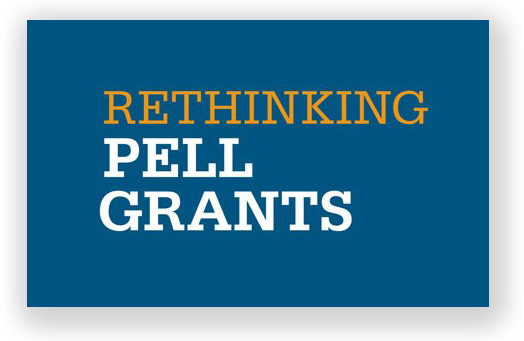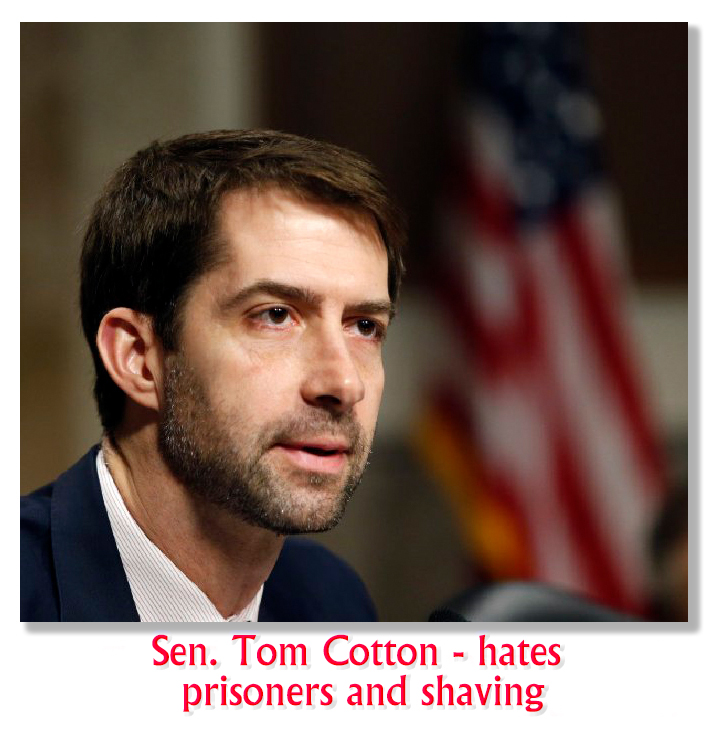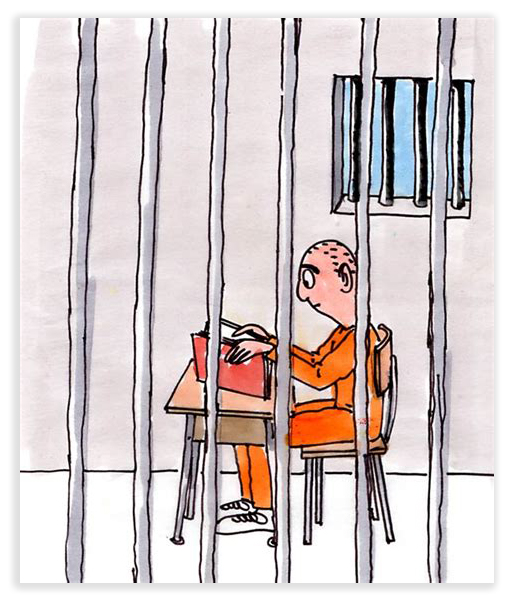We post news and comment on federal criminal justice issues, focused primarily on trial and post-conviction matters, legislative initiatives, and sentencing issues.

THE SHORT ROCKET
Some People Need to be Locked Up…
 A lot of people rely on Angel Tree to provide gifts to their kids at Christmas. Angel Tree, in turn, relies on volunteers and donations to be able to fill prisoners’ wishes for their kids.
A lot of people rely on Angel Tree to provide gifts to their kids at Christmas. Angel Tree, in turn, relies on volunteers and donations to be able to fill prisoners’ wishes for their kids.
A Waco, Texas, Angel Tree volunteer who police say stole Christmas presents meant for children with parents in prison, was arrested last week.
According to the arrest affidavit, Charabe Allison would either give donated clothing to her own family members or exchange the items at stores for gift cards. She was caught because clothing was returned to a local store that a store worker had bought with an employee discount. Because such clothing was not returnable, management questioned the employee, who then reported that her donation to Angel Tree had been returned for credit.
Despite my predisposition against indiscriminate incarceration, I think this woman needs to be locked up…
Waco, Texas, Tribune, Angel Tree volunteer arrested, accused on exchanging gifts for store credit (July 16)

College Administrators Urge Full Repeal of Pell Ban…
Vivian Nixon, who as an Education Department employee pushed the 2015 Pell Grant experimental reinstatement for a limited number of incarcerated students last week told a meeting of college executives that Congress should lift the 1994 ban on federal student aid to prisoners.
 Nixon, now director or the College and Community Fellowship, told proponents of college education that the success of the Second Chance Pell pilot program justifies full reinstatement of Pell Grants for incarcerated students. Education Secretary Betsy DeVos, also a speaker, reaffirmed her support for the program, but said, “It’s Congress’s chance to act and do its job to make sure to extend this opportunity in a very sustainable and predictable way to many more people across our country.”
Nixon, now director or the College and Community Fellowship, told proponents of college education that the success of the Second Chance Pell pilot program justifies full reinstatement of Pell Grants for incarcerated students. Education Secretary Betsy DeVos, also a speaker, reaffirmed her support for the program, but said, “It’s Congress’s chance to act and do its job to make sure to extend this opportunity in a very sustainable and predictable way to many more people across our country.”
About 1,000 students have graduated with degrees or postsecondary certificates since the Second Chance program began in 2016. The Trump administration and Sen. Lamar Alexander (R-Tennessee), chairman of the Senate education committee, support a repeal of the 1994 ban in a reauthorization of the Higher Education Act.
Inside Higher Education, Taking Stock of Pell Grants Behind Bars (July 16)

BOP Officials Promoted and Given Bonuses Despite Tight Budgets and Infrastructure Failure…
The Bureau of Prisons paid $1.6 million in bonuses to its top executives and wardens during the past two years despite chronic staffing shortages and sharp critiques of prison management leveled by Congress, according to USA Today.
 The payments ranged from $5,400 to $23,800 per official. The largest sums went to the agency’s leadership team, including $20,399 to acting director Hugh Hurwitz, and the wardens of prisons who confronted what union officials described as dangerous shortages of guards.
The payments ranged from $5,400 to $23,800 per official. The largest sums went to the agency’s leadership team, including $20,399 to acting director Hugh Hurwitz, and the wardens of prisons who confronted what union officials described as dangerous shortages of guards.
Joseph Coakley, who managed USP Hazelton, where Whitey Bulger and two other inmates were murdered last year, received $20,399 on top of $34,500 paid out during 2015 and 2016 for his work at Hazelton and at FCI Beckley.
Meanwhile, Herman Quay, whose mishandling of the infrastructure crisis as warden of MDC Brooklyn last winter and bumbling coverup of the freezing conditions and loss of electricity there during a cold snap made national headlines, has been promoted to warden at FCC Allenwood. At the new assignment, Quay is responsible for some 3,400 prisoners, about twice the residents of MDC Brooklyn.
A DOJ Inspector General’s investigation into the power loss is not yet complete, but Robert Gottheim, the district director for House Judiciary Committee chairman Jerrold Nadler (D-N.Y.), complained, “It’s certainly not acceptable that the person who was responsible for the care of all the inmates at that facility, who from our perspective did not exercise due care, would then be getting a promotion to another facility, let alone a promotion before we have the investigation made public.”
USA Today, Federal prison officials get bonuses as staffing shortages, management problems persist (July 16)
The Intercept, The Warden tried to cover up a crisis at his freezing Brooklyn Jail — then he got promoted (July 17)

House Subcommittee Holds Hearing on Women in Prison
Piper Kerman, author of the novel turned Netflix series “Orange is the New Black,” testified before a House Judiciary subcommittee on her experiences in federal prison last week.
 Kerman, reform advocate Cynthia Shank and others spoke at a hearing on women in the criminal justice system, to discuss ways to make sure women are not overlooked in the conversation on criminal justice reform and to argue for a shift in policy to directly impact the growing number of women in prison.
Kerman, reform advocate Cynthia Shank and others spoke at a hearing on women in the criminal justice system, to discuss ways to make sure women are not overlooked in the conversation on criminal justice reform and to argue for a shift in policy to directly impact the growing number of women in prison.
“Policies, not crime, drive incarceration,” Kerman said.
Women are now the fastest growing segment of the incarcerated population and initiatives to slow and even reverse the growth of the prison population have had disproportionately less effect on women, according to the Prison Policy Initiative. Nearly 150,000 women are pregnant when they are admitted into prison.
ABC News, House Judiciary subcommittee meets to discuss growing population of women behind bars (July 16)
– Thomas L. Root


 The 5,593-page stimulus package passed by Congress and signed last night by President Trump had none of the changes to compassionate release, CARES Act home confinement or elderly offender home confinement included in HEROES. However, the bill does resume federal college financial aid to prison inmates – Pell grants – that was banned in the 1994 crime bill championed by then-Senator Joseph R. Biden Jr.
The 5,593-page stimulus package passed by Congress and signed last night by President Trump had none of the changes to compassionate release, CARES Act home confinement or elderly offender home confinement included in HEROES. However, the bill does resume federal college financial aid to prison inmates – Pell grants – that was banned in the 1994 crime bill championed by then-Senator Joseph R. Biden Jr. The other curious feature – omission, perhaps – in the new stimulus package is this: after the uproar over inmates being eligible to receive the $1,200 stimulus payment in the CARES Act, there was no doubt that inmates would be cut out of any stimulus payment in the bill signed last night. But the legislation contains not a whisper that incarcerated people are exempt. Rather, it merely adopts the CARES Act eligibility requirement without change, meaning that inmates remain eligible for the stimulus payment, just like they were last spring.
The other curious feature – omission, perhaps – in the new stimulus package is this: after the uproar over inmates being eligible to receive the $1,200 stimulus payment in the CARES Act, there was no doubt that inmates would be cut out of any stimulus payment in the bill signed last night. But the legislation contains not a whisper that incarcerated people are exempt. Rather, it merely adopts the CARES Act eligibility requirement without change, meaning that inmates remain eligible for the stimulus payment, just like they were last spring.












